| Listing 1 - 10 of 45 | << page >> |
Sort by
|
Book
ISBN: 2110877723 9782110877727 Year: 1994 Volume: 1066(I) Publisher: Paris : Assemblée nationale,
Abstract | Keywords | Export | Availability | Bookmark
 Loading...
Loading...Choose an application
- Reference Manager
- EndNote
- RefWorks (Direct export to RefWorks)
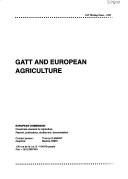
ISBN: 9282739392 Year: 1996 Publisher: Luxembourg Office for official publications of the European communities
Abstract | Keywords | Export | Availability | Bookmark
 Loading...
Loading...Choose an application
- Reference Manager
- EndNote
- RefWorks (Direct export to RefWorks)
Agriculture and state --- Produce trade --- Tariff on farm produce --- Government policy --- Uruguay Round (1987-1994)
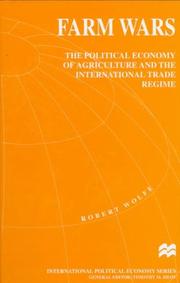
ISBN: 0312177003 Year: 1998 Publisher: New York : St. Martin's Press,
Abstract | Keywords | Export | Availability | Bookmark
 Loading...
Loading...Choose an application
- Reference Manager
- EndNote
- RefWorks (Direct export to RefWorks)
Agriculture and state --- Produce trade --- Protectionism --- Social Sciences and Humanities. Economics --- Congresses. --- Government policy --- International Economy --- International Trade. --- Uruguay Round (1987-1994).
Book
Year: 1987 Publisher: Washington, DC : The Congress of the United States, Congressional Budget Office,
Abstract | Keywords | Export | Availability | Bookmark
 Loading...
Loading...Choose an application
- Reference Manager
- EndNote
- RefWorks (Direct export to RefWorks)
Commercial law. --- Foreign trade regulation. --- Tariff --- Law and legislation. --- General Agreement on Tariffs and Trade (Organization) --- Uruguay Round --- Uruguay Round (1987-1994) --- United States --- United States. --- Commercial policy.
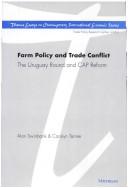
ISBN: 0472107275 Year: 1996 Volume: *1 Publisher: Ann Arbor The University of Michigan Press
Abstract | Keywords | Export | Availability | Bookmark
 Loading...
Loading...Choose an application
- Reference Manager
- EndNote
- RefWorks (Direct export to RefWorks)
Book
ISBN: 0333720733 Year: 1998 Publisher: Houndmills : Macmillan,
Abstract | Keywords | Export | Availability | Bookmark
 Loading...
Loading...Choose an application
- Reference Manager
- EndNote
- RefWorks (Direct export to RefWorks)
Ad valorem tariff --- Barrières commerciales tarifaires --- Barrières tarifaires --- Border taxes --- Buitenlandse handel --- Commerce extérieur --- Commerce extérieur international --- Commerce international --- Commerce mondial --- Customs (Tariff) --- Customs duties --- Douanes -- Tarifs --- Douanetarieven --- Droits de douane (Tarif) --- Duties (Taxes) --- External trade --- Foreign commerce --- Foreign trade --- Global commerce --- Global trade --- Import controls --- Import fees --- Industrial policy --- Industrieel beleid --- International trade --- Internationale handel --- Politique industrielle --- Politique tarifaire --- Protection tarifaire --- Retaliation (Economics) --- Régime douanier --- Régime tarifaire --- Régimes douaniers --- Tarif des douanes --- Tarif douanier --- Tariff --- Tariff on raw materials --- Tarifs douaniers --- Uruguay Round (1987-1994) --- World trade --- Échanges commerciaux internationaux --- Échanges internationaux --- General Agreement on Tariffs and Trade (Organization) --- World Trade Organization --- Uruguay Round - (1987-1994)
Book
ISBN: 044481972X 1322269726 1483290530 Year: 1995 Volume: 230 Publisher: New York Elsevier Science
Abstract | Keywords | Export | Availability | Bookmark
 Loading...
Loading...Choose an application
- Reference Manager
- EndNote
- RefWorks (Direct export to RefWorks)
Agronomy --- European Union --- Uruguay Round (1987-1994) --- Agriculture and state --- Produce trade --- Tariff on farm produce --- Social Sciences and Humanities. Agricultural Economics --- Government policy --- Agricultural Policy --- Uruguay Round --- Agricultural Policy. --- European Union countries --- Agriculture and state - European Union countries. --- Produce trade - Government policy - European Union countries. --- Tariff on farm produce - European Union countries.
Book
ISBN: 220001984X 9782200019846 Year: 1998 Volume: *6 Publisher: Paris : Colin,
Abstract | Keywords | Export | Availability | Bookmark
 Loading...
Loading...Choose an application
- Reference Manager
- EndNote
- RefWorks (Direct export to RefWorks)
Uruguay Round (1987-1994) --- General Agreement on Tariffs and Trade (Organization) --- World Trade Organization --- 339.5 --- AA / International- internationaal --- 334.81 --- Wereldhandelsorganisatie (WHO). Algemene overeenkomst voor handel en tarieven (GATT). --- International trade --- Management --- Union européenne --- Foreign economic relations --- Wereldhandelsorganisatie (WHO). Algemene overeenkomst voor handel en tarieven (GATT) --- World Trade Organization.
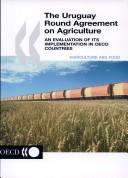
ISBN: 1280029897 9786610029891 9264192182 9264186263 Year: 2001 Publisher: Paris : OECD Publishing,
Abstract | Keywords | Export | Availability | Bookmark
 Loading...
Loading...Choose an application
- Reference Manager
- EndNote
- RefWorks (Direct export to RefWorks)
The Uruguay Round Agreement on Agriculture (URAA) was a turning point in the reform of the agricultural trade system. It imposed disciplines on trade-distorting domestic policies and established new rules in the areas of market access and export competition. How effective have the three disciplines contained in the URAA been in bringing about a reduction in the level of production-related support and protection? Which elements of the disciplines have proved effective and which ineffective? What policy lessons can be drawn from the experience so far? What might be inferred about opportunities and challenges for further trade liberalisation? This report provides some answers to these questions for all OECD countries. A key conclusion of the report is that the immediate quantitative effects of the URAA on trade and protection levels have been modest. The reasons for this include the weakness of many specific features of the URAA including implementation and methodological issues. Countries have already embarked on a new round of multilateral trade negotiations on agriculture. The challenge facing policy makers is to build upon the foundation of the URAA to further reduce trade distortions. This requires strengthening the disciplines already established under the URAA and addressing those weaknesses of the current agreement which have been identified in this study.
Agriculture and state -- OECD countries. --- Produce trade -- OECD countries. --- Tariff on farm produce -- OECD countries. --- Uruguay Round (1987-1994) Produce trade -- OECD countries. --- Uruguay Round (1987-1994). --- Produce trade --- Agriculture and state --- Tariff on farm produce --- Uruguay Round --- Farm produce --- Tariff on agricultural products --- Agrarian question --- Agricultural policy --- Agriculture --- State and agriculture --- Economic policy --- Land reform --- Agricultural marketing --- Agricultural products --- Food trade --- Food industry and trade --- Commodity exchanges --- Tariff --- Government policy --- Economic aspects --- Cycle d'Uruguay --- Gyros Ourougouaēs --- Gyros tēs Ourougouaēs --- Jawlat Ūrūjuwāy --- Multilateral Trade Negotiations, the Uruguay Round --- Negociaciones Comerciales Multilaterales, Ronda Uruguay --- Négociations commerciales multilatérales, Cycle d'Uruguay --- Putaran Uruguay --- Ronda Uruguay --- Rō̜p ʻUrukwai --- Uruguai Raundŭ --- Uruguay Round of MTNs --- Uruguay Round of Multilateral Trade Negotiations --- Uruguay Runde --- Urugwai Raundŭ --- Wu-la-kuei hui ho --- Uruguay
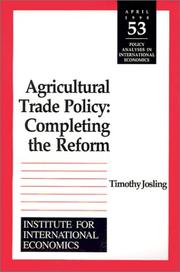
ISBN: 0881322563 Year: 1998 Publisher: Washington, D.C.
Abstract | Keywords | Export | Availability | Bookmark
 Loading...
Loading...Choose an application
- Reference Manager
- EndNote
- RefWorks (Direct export to RefWorks)
Foreign trade policy --- Agriculture. Animal husbandry. Hunting. Fishery --- Agriculture and state --- Produce trade --- 382.41 --- 338.722.7 --- 382.30 --- AA / International- internationaal --- US / United States of America - USA - Verenigde Staten - Etats Unis --- Agrarian question --- Agricultural policy --- Agriculture --- State and agriculture --- Economic policy --- Land reform --- Government policy --- Buitenlandse handel in landbouwproducten --- Handels- en wisselpolitiek in hun verband met de buitenlandse handel: algemeenheden --- Uruguay Round (1987-1994)
| Listing 1 - 10 of 45 | << page >> |
Sort by
|

 Search
Search Feedback
Feedback About UniCat
About UniCat  Help
Help News
News